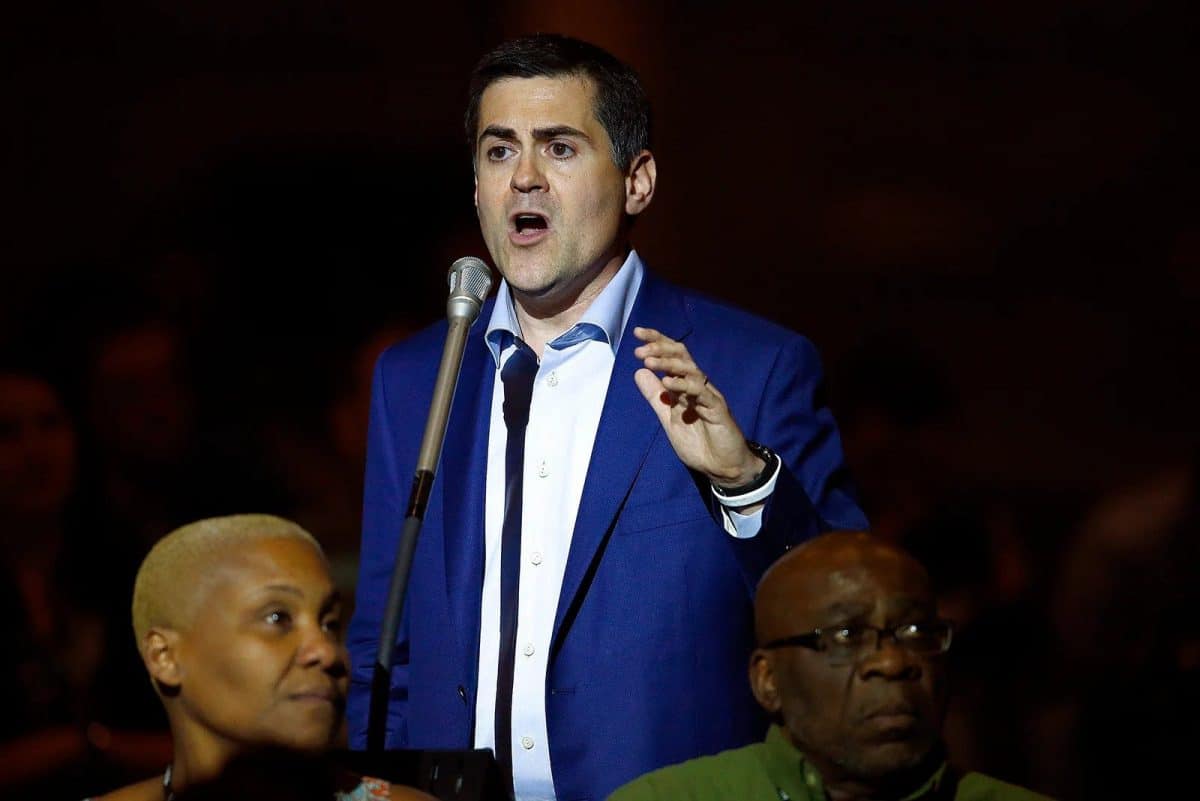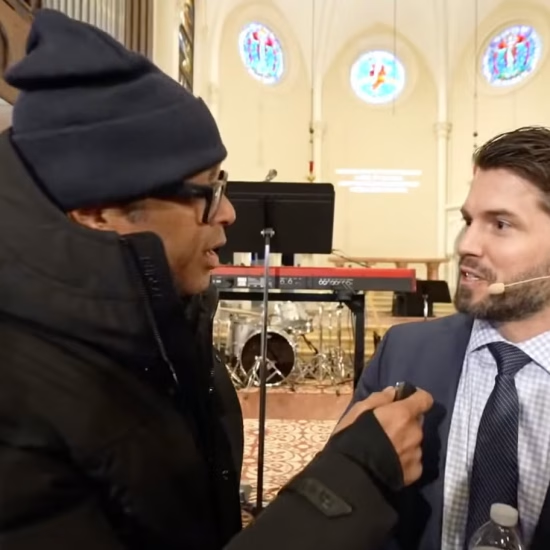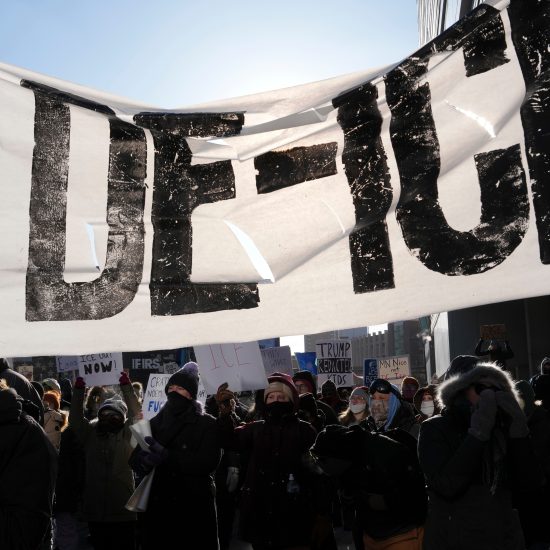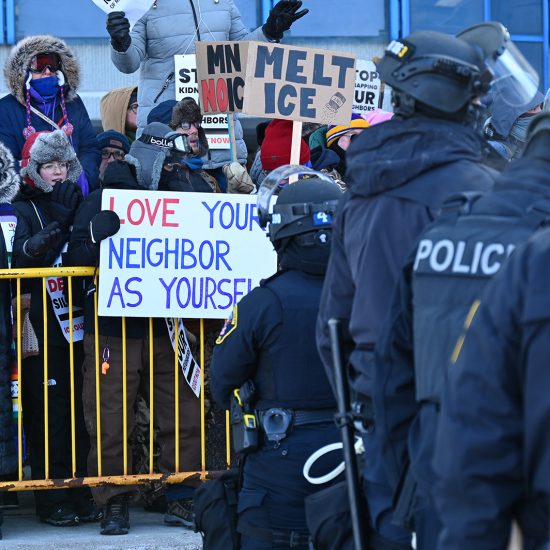
NASHVILLE (RNS) — Southern Baptists love three things: Jesus, the Bible, and a good fight. The first two have led Southern Baptists to send missionaries all over the world, build colleges and hospitals, plant thousands of churches, and develop one of the largest disaster relief networks in the country.
Their fights, however, often overshadow everything else.
The latest headline coming from the United States’ largest Protestant denomination — Russell Moore’s resignation from the presidency of the Ethics and Religious Liberty Commission, the SBC’s public policy arm — has put the Southern Baptists’ propensity for controversy on clear display.
Conservative, pro-life, anti-same-sex marriage, Moore was hardly a theological outlier among his fellow Southern Baptist leaders, yet his opposition to the candidacy of Donald Trump, whom Moore had once called “an arrogant huckster,” as well as his sympathy for immigrants and concern for the SBC’s sexual abuse victims, put him out of step with the SBC’s political culture.

In this June 14, 2017, photo, Russell Moore, then-president of the Ethics & Religious Liberty Commission, speaks at the Southern Baptist Convention annual meeting in Phoenix, Arizona. (Ross D. Franklin/Associated Press)
Elected in 2013, Moore was deemed “a source of significant distraction” in a report issued earlier this year by the SBC’s Executive Committee. Critics accused him of being a liberal, and megachurch pastors began to withhold money from the denomination’s missions program in protest.
Moore is gone, taking a job with Christianity Today, but expelling a nettlesome dissenter hasn’t solved a raft of serious problems. At the denomination’s annual meeting in Nashville next month, the leadership will face conflicts over race, the role of women in the church, and the unsettled question of how to deal with sexual abuse.
Perhaps most worrying for leadership is the relentless decline in membership, falling by more than two million over the past 15 years, even as several high-profile leaders, such as beloved Bible teacher Beth Moore and well-known Black pastor Charlie Dates, have exited the denomination.
Chuck Kelley, the former president of New Orleans Baptist Theological Seminary and a leader in the Conservative Baptist Network, a new organization within the SBC that has been critical of current leadership, summed up the denomination’s situation this way: “Southern Baptists are in serious trouble.”
Rather than pull back on controversy, the Southern Baptists are characteristically doubling-down.
When Saddleback Church, an enormous California megachurch run by the Rev. Rick Warren, perhaps the best-known Southern Baptist in the country, ordained three women pastors earlier this month, critics leapt to call for an investigation. (Women pastors are forbidden by the SBC’s statement of faith.) Objections to a pronouncement from six Southern Baptist seminary presidents calling critical race theory “incompatible” with the statement of faith have been largely ignored by top officials.
Author and speaker Trillia Newbell, a former staff member at the ERLC who has had a front-row seat for the controversies in recent years, said the infighting raises a perplexing question: How do Southern Baptists tell the outside world about the love of Jesus if they can’t stand one another?
“What is so strange to me is people believe that by fighting, they are being faithful,” said Newbell. “It’s hard to convince someone that they may need to be slow to speak and to tame their tongue if they think they’re right. And if they think they’re fighting for Jesus.”
With fewer resources and a changing culture outside the church, Christians of all stripes are fighting over how to apply their doctrines and how to spend their money, Rainer said. They no longer have a shared church culture — they don’t sing the same songs or study the same books or worship in the same way. Thom Rainer, a longtime Southern Baptist leader, said the challenges facing the SBC are common to many denominations built and held together by shared doctrine, mission, culture and geography.
“What is happening in the SBC is that we’re seeing a fraying of all of those ties,” he said.
The general turmoil in American culture has also affected Southern Baptists, said historian Nathan Finn, dean of the faculty at North Greenville University in South Carolina. Baptists might agree on theology and church practice and even be very conservative and still be divided about discussions of politics, race, and gender, Finn said.
Those fault lines have made it harder for Southern Baptists to cooperate in their system of funding national and international ministry, known as the Cooperative Program. With no strong central authority, their sharing of resources is completely based on trust.
Southern Baptists also struggle with consensus on their statement of faith, known as the Baptist Faith and Message, first adopted in 1925. Finn summed up their approach this way: “Within the SBC, how do we work the broadest consensus possible, even if that means there might be some people in the consensus who make some of us nervous?”
“Where there is a lack of trust, there is a lack of commitment to cooperative missions and thus, the Cooperative Program,” said Finn.
Other Southern Baptists, he said, “want to clarify the differences.” These Baptists might not want to kick out everyone they disagree with but want to limit who is able to “drive the bus,” as Finn put it.
“The question really is, what are you willing to tolerate for the sake of cooperation?” he said.
The divides in the SBC are exacerbated by the denomination’s significant decline. The SBC’s membership peaked in 2006 at about 16.3 million members. According to data released Thursday (May 20), there are now about 14 million Southern Baptists, a decline of 2.3 million.
Baptisms, meanwhile, dropped by half, to 123,160, though much of this falloff is likely due to the COVID-19 pandemic’s shuttering of in-person services for much of 2020. The denomination also grew by 588 churches.
Ryan Burge, an assistant professor of political science at Eastern Illinois University and an American Baptist pastor, predicts that by 2025, Baptists will be at about half their former size, “and more politically homogenous than ever.”
Both current SBC leaders and their critics agree that addressing the decline, and a refocus on evangelism, is paramount. Earlier this year, Ronnie Floyd, a former megachurch pastor who now leads the SBC’s Executive Committee, announced plans for “Vision 2025,” an initiative to send out new missionaries, plant more new churches and increase evangelization of young people.
Kelley, of the Conservative Baptist Network, sees the decline as an organizational failure. The denomination’s North American Mission Board, he said, moved away from personal evangelism in the 1980s to a focus on church planting. That has led to more churches but not more baptisms and Southern Baptists.
Churches have also dropped the ball on keeping and inspiring church members, he said, a practice known as “discipling.” From the 1920s to the 1970s, he said, Southern Baptists had a range of programs to help people grow in their faith and learn to live according to Christian teaching. Those programs, he said, have largely run out of steam and disappeared.
“You combine that failure of discipleship with less and less attention to evangelism and a culture that is less and less hospitable to the Christian faith and guess what?” he said. “You have declining churches.”
But Kelley also faults a major upheaval during the 1980s known as the Conservative Resurgence, in which a rear guard of traditionalists who favored male headship of the family and attachment to the Republican Party prevailed in the “battle for the Bible.” The conservative movement won a theological battle over liberals in the denomination, but it didn’t make the SBC “more effective in reaching our nation and our world for Christ,” said Kelley, who supported the resurgence.
Now Kelley and others in the Conservative Baptist Network see themselves battling “incipient liberal theology” that has invaded the SBC anew. Discussions of social justice, Black Lives Matter, and critical race theory are all signs of liberalism sneaking in the back door. Kelley believes that the Southern Baptist Convention, which was founded by slaveholders and thrived in the Jim Crow South, has moved on since repenting of its racism in a 1995 resolution disavowing its past. It has no need, he said, for unbiblical movements such as Black Lives Matter or CRT.
The Conservative Baptist Network, formed in 2020, exists in part to hold the line against what it calls “worldly ideologies” infiltrating the Southern Baptist Convention. Its leaders recently published the text of a resolution condemning critical race theory at a website entitled “Southern Baptists Against Racism.”
In a statement published on the network’s website, the group wished Moore well in his new role at Christianity Today and asked Baptists to pray for the future of the ERLC.
The statement also praised Georgia Baptist pastor Mike Stone, a longtime critic of Moore and the ERLC who is running for SBC president at June’s annual meeting. Stone, a former chair of the SBC Executive Committee, pressed for and led a recent task force that looked into Moore’s leadership at the ERLC and its effect on giving in the SBC.
“Pastor Mike Stone did not just talk about the issues,” the statement read. “He boldly acted in the face of great opposition. That is the very kind of leadership that is critically needed at this hour. We would do well to remember this as we vote for the next president of our Southern Baptist Convention.”
Randy Davis, executive director of the Tennessee Baptist Mission Board, said that he was thankful for the leadership Moore showed during his time at the ERLC, especially on pro-life concerns. But he called Moore’s departure an “opportunity for a new direction.”
Just as many, however, will be disturbed by where Moore’s departure leaves the SBC. The Rev. Marshal Ausberry Sr., president of the National African American Fellowship of the SBC, said Moore has been key to the denomination’s handling of racial matters, specifically encouraging his fellow Southern Baptists to live up to the 1995 resolution.
“Dr. Moore has been a tremendous friend to the National African American Fellowship and on the forefront of race relations,” Ausberry said. “He’s been a very positive force in the convention and sometimes even the conscience of the convention in the area of race relations.”
He added that Moore has left “tremendous” footprints in the denomination and that he can’t be replicated.
“I think the person coming in can’t be another Russell Moore, but if they’re a person of good conscience and good moral character and a high view of Scripture, and not only the Great Commission but also the Great Commandment, that we love one another, they will, as God has wired them, they will fill the void.”
Healing those divides will take repentance and honest conversation and some changes, said Newbell. “I feel very much like, this is what the Bible says,” she said. “Why don’t we just do it?”Newbell pointed out that Moore’s tenure at the ERLC did not create divisions over race and politics in the SBC. The polarization of recent years simply revealed what was hidden.
The answer may lie in the Southern Baptists’ proclivity for fighting.
Phillip Bethancourt, the pastor of Central Church in College Station, Texas, and former vice president of the ERLC, said Moore told him that he was leaving in part because of the toll the years of anger toward him was taking on his family.
At one point, one of Moore’s sons went to him with a question: Did you do something wrong? That led Moore to take his son to a meeting of the SBC’s Executive Committee so that the young man could see what was happening with his dad.
That reason for Moore’s departure, as much as anything else, left Bethancourt worried about the SBC’s future.
“The Southern Baptist Convention has to decide whether they want to be a house of prayer for the nations or a retirement home for a furious few,” he said.






